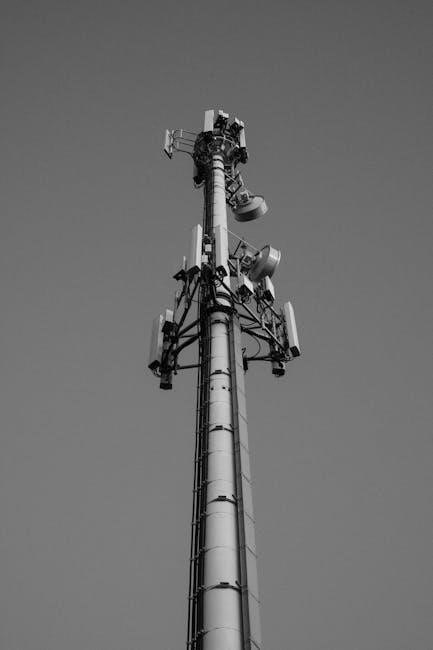
Sarah Ruhl’s Dead Man’s Cell Phone is a dark comedy that explores themes of death, technology, and human connection. The play follows Jean, an unremarkable woman, who answers a stranger’s ringing phone in a café, leading to a surreal journey. This award-winning work by Ruhl, a Pulitzer Prize finalist, blends quirky humor with profound reflections on modern life.

Overview of the Play and Its Author
Sarah Ruhl is a renowned American playwright, essayist, and professor, celebrated for her unique blend of lyrical prose and surreal storytelling. Born in 1974, Ruhl has gained acclaim for works like The Clean House and Eurydice, earning her a Pulitzer Prize nomination and a MacArthur “Genius” Grant. Her play Dead Man’s Cell Phone, first published in 2008, is a dark comedy that delves into themes of death, technology, and human connection. The story follows Jean, a shy museum worker, who answers a stranger’s incessantly ringing cell phone in a café, only to discover the owner, Gordon, is dead. This act sets off a chain of events that intertwines Jean with Gordon’s family and acquaintances, exploring how technology both isolates and connects us. Ruhl’s signature style of magical realism and poetic dialogue makes the play a thought-provoking commentary on modern life. The script is widely available in PDF format for study and performance, showcasing Ruhl’s mastery of contemporary theatre.
The Plot Summary
Dead Man’s Cell Phone follows Jean, a shy museum worker, who answers a stranger’s ringing phone in a café. The owner, Gordon, is dead, and Jean becomes entangled in his life, navigating his family and associates through the phone’s connections, exploring themes of isolation and human bonds.
The Premise: A Strangers Cell Phone
The Premise: A Stranger’s Cell Phone
The premise of Sarah Ruhl’s Dead Man’s Cell Phone revolves around a simple yet profound act: Jean, a shy and unremarkable woman, answers a stranger’s incessantly ringing cell phone in a quiet café. This moment sparks a chain of events that delve into themes of death, identity, and human connection. The stranger, Gordon, is found dead, and Jean, compelled by empathy, decides to answer his phone, unaware of the complexities it will unravel. Through this act, Jean becomes entangled in Gordon’s life, interacting with his family, associates, and even his mother, who mourns his loss. The cell phone serves as a metaphorical bridge between the living and the dead, exploring how technology mediates human relationships. Ruhl’s script masterfully blends magical realism with dark humor, creating a narrative that examines the isolation of modern life and the unexpected ways people find meaning and connection. The premise is both quirky and profound, setting the stage for a journey of self-discovery and redemption.
Key Events and Character Development
The play unfolds through Jean’s transformation after answering the stranger’s cell phone. Initially timid and unassuming, Jean becomes entangled in the life of Gordon, the deceased owner of the phone. She interacts with his mother, mistress, and business partner, uncovering the complexities of his life. These interactions reveal Jean’s empathetic nature and her desire for connection. The cell phone becomes a catalyst for her growth, as she navigates unexpected responsibilities and emotions. Through her journey, Jean confronts her own identity and sense of purpose, evolving from an isolated individual to someone embracing life’s unpredictability. The supporting characters, such as the Other Woman and Gordon’s mother, add depth to the narrative, highlighting themes of grief, guilt, and redemption. Ruhl’s script skillfully weaves humor and poignancy, allowing Jean’s character to shine as she discovers meaning in the chaos surrounding her. The play’s events are both surreal and deeply human, driving Jean’s transformation and the exploration of her inner world.
The Climax and Resolution
The climax of Dead Man’s Cell Phone occurs when Jean confronts the moral and emotional weight of her role as the guardian of Gordon’s legacy. Torn between truth and deception, she must decide whether to continue impersonating him or reveal the reality of his death to his loved ones. This pivotal moment showcases Jean’s inner struggle and her growing sense of responsibility. In the resolution, Jean finds solace in her newfound connection to Gordon’s family and the world around her. She ultimately lays the phone—and her burdens—to rest, symbolizing her liberation from the past. The play concludes on a hopeful note, emphasizing Jean’s personal growth and her ability to embrace life’s unpredictability. The resolution ties together themes of identity, grief, and redemption, leaving audiences with a poignant reflection on modern existence and human connection.

Themes and Symbolism
Dead Man’s Cell Phone explores themes of grief, identity, and human connection through the symbolic use of a cell phone. The play delves into isolation, technology’s intrusion on intimacy, and the search for meaning in a chaotic world.
Exploration of Death and Technology
Dead Man’s Cell Phone delves into the intersection of death and technology, using a ringing phone as a catalyst for exploring mortality. The play examines how technology both connects and isolates individuals, particularly in moments of loss. Jean’s journey, triggered by answering a stranger’s phone, highlights the tension between the digital world and human intimacy. The cell phone becomes a symbolic bridge between the living and the dead, revealing how modern society grapples with grief in an era dominated by technology. Ruhl’s script critiques the ways in which devices mediate our experiences of death, often creating a disconnect between the physical and emotional realms. Through this lens, the play challenges audiences to reflect on how technology shapes their understanding of life’s finality and the memories that linger beyond it.
Grief, Identity, and Human Connection

At its core, Dead Man’s Cell Phone is a poignant exploration of grief, identity, and the complexities of human connection. Jean’s decision to answer the stranger’s phone sets her on a path of self-discovery, as she grapples with the aftermath of Gordon’s death and her own sense of purpose. The play examines how grief can both unite and isolate individuals, as Jean becomes entangled in the lives of Gordon’s family and associates. Through her interactions, Ruhl highlights the tension between authenticity and pretense, as Jean struggles to reconcile her own identity with the roles she assumes in others’ lives. The script also underscores the fragility of human relationships in a world dominated by technology, where true connection often feels elusive. By weaving these themes together, Ruhl creates a deeply emotional and thought-provoking narrative that invites audiences to reflect on their own experiences of loss and belonging.

Reception and Reviews
Sarah Ruhl’s Dead Man’s Cell Phone received critical acclaim for its unique blend of dark humor and emotional depth. Audiences praised its thought-provoking themes, solidifying Ruhl’s reputation as a visionary playwright.
Critical Acclaim and Audience Response
Sarah Ruhl’s Dead Man’s Cell Phone garnered widespread critical acclaim for its unique narrative and emotional depth. Critics praised Ruhl’s ability to weave humor with poignant reflections on mortality and technology. Audiences resonated with the play’s exploration of grief and identity, finding it both relatable and thought-provoking. The production’s surreal elements and strong character development were particularly highlighted, showcasing Ruhl’s innovative storytelling. The play’s success further cemented her reputation as a leading voice in contemporary theater, earning her numerous accolades and a loyal following.